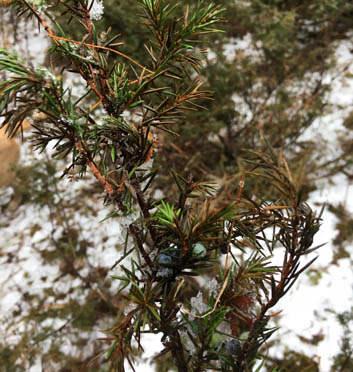Adam Prudhomme
Beaver Staff
To the trained eye, a snow covered forest can offer plenty of harvestable greens and berries in the middle of winter.
As someone with a trained eye, Ruthie Cummings will be showing others what to look for during her March 16 Winter Foraging Workshop, held at Amherst Island’s Topsy Farms. At a cost of $40 per person, she’ll lead a walk along wooded trails, teaching how to identify, collect and process wild edibles that grow in the winter.
“A lot of people think of it as a cold, barren land,” said Cummings. “But there’s still quite a bit you can harvest and make into things.”
Among the items she’ll highlight are birch, chaga and various uses for pine needles, which includes using it as a natural seasoning for fresh caught fish.
“You put (the fish) on a hot rock in a fire,” said Cummings. “You set the pine needles on fire on top so it actually infuses this beautiful pine taste into the fish and it cooks the top layer while the stone cooks the bottom layer. This is something you can do in the dead of winter and it’s so delicious.”
Cummings’ workshop will be full of tips like that, using readily available plants that grow in the harshest of conditions.
“It’s basically going back to our roots,” said Cummings. “The roots of the land. I come from a European upbringing. My mother taught me foraging at a very young age. European cultures still tend to really focus on foraging year round whereas in North America it’s traditionally just an Indigenous action. Nobody uses it in mainstream lifestyle these days because we haven’t passed it on from generation to generation.”
Much of what gets covered in the workshop will be everyday plants that would otherwise be overlooked by most people.
“It’s about opening people’s eyes to what greater function our land offers us on a 365 day a year cycle,” said Cummings. “It’s quite interesting when you look at it from a different perspective.”
One example Cummings uses is the sumac plant, which grows in abundance in the Lennox and Addington region.
“We’re actually importing a lot of this particular spice into Canada when we actually have it right in our own backyard,” said Cummings. “Teaching people how to harvest it and identify how to do the processing of it so they can have it for themselves, it’s quite astonishing. With all the sumac we have here we should become the front runners in the industry of spice export, we have so much of it here.”
For Cummings, teaching an outdoor workshop is more than just a hobby to her.
“It’s something that I feel is a responsibility from my side, to pass it on to people,” she said of her foraging skills. “With economics as they are, everything’s getting so much more expensive. Learning how to go back to nature and understanding the ethical ways to harvest and what you need to turn it into beautiful meals is important.”
Tickets to her March 16 workshop are available through her workshop www.WildfeastCatering.com/events. She plans to host similar workshops throughout the Kingston region all year round.

